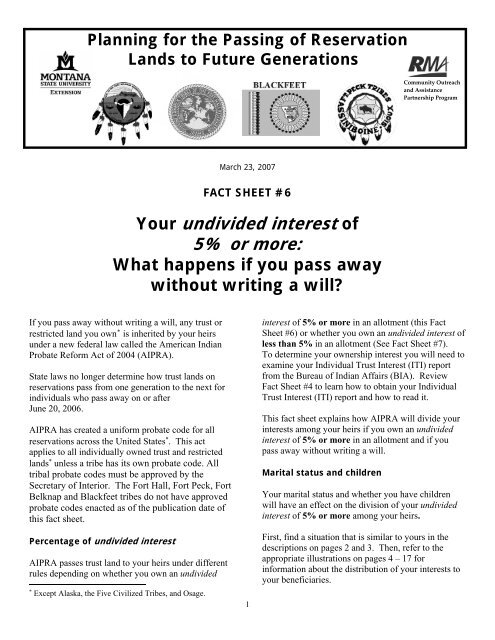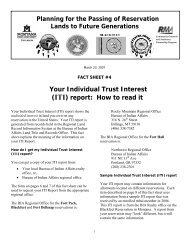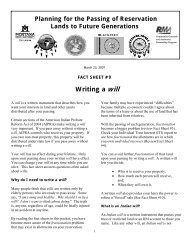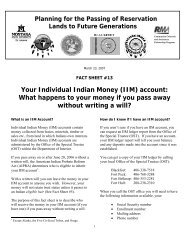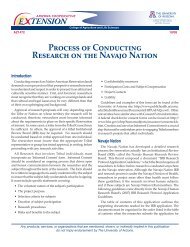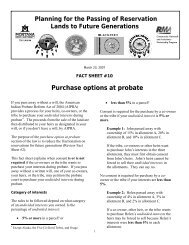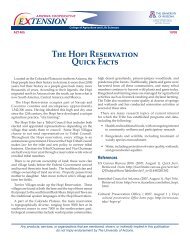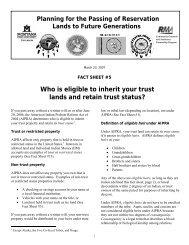AIPRA Factsheet 6 - Indian Country Extension
AIPRA Factsheet 6 - Indian Country Extension
AIPRA Factsheet 6 - Indian Country Extension
- No tags were found...
You also want an ePaper? Increase the reach of your titles
YUMPU automatically turns print PDFs into web optimized ePapers that Google loves.
Planning for the Passing of Reservation<br />
Lands to Future Generations<br />
Community Outreach<br />
and Assistance<br />
Partnership Program<br />
March 23, 2007<br />
FACT SHEET #6<br />
Your undivided interest of<br />
5% or more:<br />
What happens if you pass away<br />
without writing a will?<br />
If you pass away without writing a will, any trust or<br />
restricted land you own ∗ is inherited by your heirs<br />
under a new federal law called the American <strong>Indian</strong><br />
Probate Reform Act of 2004 (<strong>AIPRA</strong>).<br />
State laws no longer determine how trust lands on<br />
reservations pass from one generation to the next for<br />
individuals who pass away on or after<br />
June 20, 2006.<br />
<strong>AIPRA</strong> has created a uniform probate code for all<br />
reservations across the United States ∗ . This act<br />
applies to all individually owned trust and restricted<br />
lands ∗ unless a tribe has its own probate code. All<br />
tribal probate codes must be approved by the<br />
Secretary of Interior. The Fort Hall, Fort Peck, Fort<br />
Belknap and Blackfeet tribes do not have approved<br />
probate codes enacted as of the publication date of<br />
this fact sheet.<br />
Percentage of undivided interest<br />
<strong>AIPRA</strong> passes trust land to your heirs under different<br />
rules depending on whether you own an undivided<br />
∗ Except Alaska, the Five Civilized Tribes, and Osage.<br />
1<br />
interest of 5% or more in an allotment (this Fact<br />
Sheet #6) or whether you own an undivided interest of<br />
less than 5% in an allotment (See Fact Sheet #7).<br />
To determine your ownership interest you will need to<br />
examine your Individual Trust Interest (ITI) report<br />
from the Bureau of <strong>Indian</strong> Affairs (BIA). Review<br />
Fact Sheet #4 to learn how to obtain your Individual<br />
Trust Interest (ITI) report and how to read it.<br />
This fact sheet explains how <strong>AIPRA</strong> will divide your<br />
interests among your heirs if you own an undivided<br />
interest of 5% or more in an allotment and if you<br />
pass away without writing a will.<br />
Marital status and children<br />
Your marital status and whether you have children<br />
will have an effect on the division of your undivided<br />
interest of 5% or more among your heirs.<br />
First, find a situation that is similar to yours in the<br />
descriptions on pages 2 and 3. Then, refer to the<br />
appropriate illustrations on pages 4 – 17 for<br />
information about the distribution of your interests to<br />
your beneficiaries.
What is your marital and child status? Check one.<br />
Single-No Children<br />
Single-With Children (legally adopted or<br />
biological)<br />
Married-No Children<br />
Married-With Children (legally adopted or<br />
biological)<br />
The term single means that you are legally divorced<br />
(not just separated), or that your spouse has passed<br />
away, or that you have never been married.<br />
• If you checked Single-no children see<br />
questions 1 – 4 (this page).<br />
• If you checked Single-with children see<br />
questions 5 – 9 (this page).<br />
The term married includes couples who are legally<br />
married, who are separated, or who have a legal<br />
separation. Separated couples are still legally<br />
married. Common law marriages are not recognized<br />
under <strong>AIPRA</strong> or by Montana and Idaho tribes.<br />
• If you checked Married-no children see<br />
question 10, page 3.<br />
• If you checked Married-with children see<br />
question 11, page 3.<br />
SINGLE-No children, no will<br />
Question 1: Are you single and do not have any<br />
living children, grandchildren, or great-grandchildren,<br />
but one or both your parents are living?<br />
Yes (See pages 4 - 5, Illustrations 1a, 1b, 1c,<br />
and 1d)<br />
No (Go to question 2)<br />
Question 2: Are you single and do not have any<br />
living children, grandchildren, or great-grandchildren,<br />
your parents are not living, and all your brothers and<br />
sisters are living?<br />
Yes (See page 5, Illustration 2)<br />
No (Go to question 3)<br />
Question 3: Are you single and do not have any<br />
living children, grandchildren, or great grandchildren,<br />
your parents are not living, and you have one or more<br />
brothers or sisters who have passed away?<br />
2<br />
Yes (See page 6, Illustrations 3a & 3b)<br />
No (If you are single without children,<br />
grandchildren or great grandchildren review<br />
questions 1 - 2. If no, go to question 4.)<br />
Question 4: If you are single and do not have any<br />
living children, grandchildren, or great-grandchildren,<br />
parents, brothers or sisters, your undivided interest of<br />
5% or more in an allotment passes to the tribe where<br />
the allotment is located (if you pass away without<br />
writing a will) (See page 7, Illustration 4).<br />
SINGLE-With children, no will<br />
Question 5: Are you single and all of your children<br />
are living, but you do not have any grandchildren?<br />
Yes (See page 8, Illustration 5)<br />
No (Go to question 6)<br />
Question 6: Are you single and all your children are<br />
living and you also have living grandchildren?<br />
Yes (See page 8, Illustration 6)<br />
No (Go to question 7)<br />
Question 7: Are you single with one or more<br />
children who have passed away and they are survived<br />
by living children (your grandchildren)?<br />
Yes (See pages 9 – 12, Illustrations 7, 7a, 7b,<br />
and 7c)<br />
No (Go to question 8)<br />
Question 8: Are you single and all of your children<br />
have passed away and they are survived by living<br />
children (your grandchildren)?<br />
Yes (See pages 13 - 14, Illustrations 8a & 8b)<br />
No (If you are single with children, review<br />
questions 5 - 8. If no, go to question 9)<br />
Question 9: If you do not have any surviving<br />
children, grandchildren, parents, brothers or sisters,<br />
your undivided interest of 5% or more in an<br />
allotment passes to the tribe where the allotment is<br />
located (if you pass away without a written will) (See<br />
page 15, Illustration 9).
Write a will<br />
If you are single and want your undivided interest in<br />
trust property to pass to individuals other than those<br />
described in questions 1 - 9, you need to write a will<br />
to distribute your land the way you desire.<br />
Married-No children or grandchildren, no<br />
will<br />
Question 10: Are you married with your spouse<br />
living and you have no living children or<br />
grandchildren?<br />
Yes (See page 16, Illustration 10)<br />
No (Go to question 11)<br />
Married-With children, no will<br />
Question 11: Are you married with your spouse<br />
living, and you have living children, grandchildren,<br />
and/or great-grandchildren?<br />
Yes (See page 17, Illustration 11)<br />
As long as your spouse is living he or she<br />
inherits all of your undivided interest in trust<br />
land of 5% or more as a life estate. Your<br />
children inherit a remainder interest in your<br />
estate. They are called remaindermen (See fact<br />
sheet #8). Your children have full ownership of<br />
your undivided interest in trust land after the<br />
passing of your spouse.<br />
No (If you are married without children<br />
review question 10)<br />
Fee or Life Estate<br />
Under <strong>AIPRA</strong> if you are married and if you have an<br />
undivided interest on a non-IRA reservation, the<br />
interest can pass to your non-<strong>Indian</strong> spouse in fee if<br />
you make a written will. However, the land will lose<br />
its trust status.<br />
Under <strong>AIPRA</strong> if you are married and if you have an<br />
undivided interest on an IRA reservation, the interest<br />
passes to your <strong>Indian</strong> or non-<strong>Indian</strong> spouse as a life<br />
estate if you don’t write a will. On an IRA<br />
reservation you cannot will interests in land to a non-<br />
<strong>Indian</strong> except in a life estate. On a non-IRA<br />
reservation you can will interests in land to a non-<br />
<strong>Indian</strong>.<br />
Write a will<br />
If you are married and want your undivided interest in<br />
trust property to pass to individuals other than those<br />
were described in illustrations 10 and 11, then you<br />
need to write a will to distribute your land the way<br />
you desire.<br />
Acknowledgements<br />
We wish to express appreciation to the Montana and Idaho<br />
Reservation <strong>Extension</strong> agents and Reservation <strong>Extension</strong><br />
student assistants on the Blackfeet, Fort Belknap, Fort Hall,<br />
and Fort Peck reservations for their assistance in reviewing the<br />
fact sheets and presenting the information to tribal members<br />
on their home reservations.<br />
Co-authors:<br />
• Marsha A. Goetting<br />
<strong>Extension</strong> Family Economics Specialist<br />
Department of Agricultural Economics and<br />
Economics<br />
Montana State University<br />
• Kristin Ruppel<br />
Department of Native American Studies<br />
Montana State University<br />
This publication was supported by the Community Outreach<br />
and Assistance Partnership Program of the Risk Management<br />
Agency USDA number 051E08310186.<br />
Disclaimer<br />
The information appearing in this fact sheet is presented for<br />
informational purposes only. The objective of the fact sheet is<br />
to help you develop an understanding of the American <strong>Indian</strong><br />
Probate Reform Act (<strong>AIPRA</strong>). The contents should not be<br />
considered as legal advice or be used as such. For legal<br />
information specific to your situation contact appropriate legal<br />
counsel with your tribe or an attorney.<br />
Future change in laws cannot be predicted and statements in<br />
this fact sheet are based solely on the rules and regulations in<br />
force on the date of publication.<br />
COPYRIGHT 2007<br />
The U.S. Department of Agriculture (USDA) prohibits discrimination in all its programs and activities on the basis of race, color, national origin, sex, religion, age, disability, political beliefs, sexual orientation, and marital or family status. (Not all prohibited bases<br />
apply to all programs). Persons with disabilities who require alternative means for communication of program information (Braille, large print, audiotape, etc.) should contact USDA’s TARGET Center at (202) 720-2600 (voice and TDD). To file a complaint of<br />
discrimination, write: USDA, Director, Office of Civil Rights, Room 326-W, Whitten Building, 14 th and Independence Avenue, SW, Washington, DC 20250-9410, or call (202) 720-5964 (voice or TDD).<br />
3
Who receives your undivided interest of 5% or more in trust<br />
lands if you pass away without a written will:<br />
(Effective for individuals who pass away on or after June 20, 2006)<br />
SINGLE* INDIVIDUALS WITHOUT CHILDREN<br />
Surviving Family<br />
Members** (Descendants<br />
in order of priority)<br />
Illustration 1a<br />
<strong>Indian</strong> Father and Mother.<br />
Illustration 1b<br />
<strong>Indian</strong> parent and Non-<strong>Indian</strong><br />
parent<br />
Illustration 1c<br />
Description of<br />
Distribution<br />
Equally divided between<br />
parents.<br />
Example: Tony, who is single,<br />
passed away. His <strong>Indian</strong> mother<br />
and father each received 1/2 of the<br />
undivided interest he owns on the<br />
Fort Peck and Fort Belknap<br />
Reservations.<br />
There is no expressed<br />
authorization for a non-<strong>Indian</strong><br />
parent to inherit under <strong>AIPRA</strong>.<br />
Tony’s undivided interests of 5%<br />
or more in each parcel would pass<br />
to his <strong>Indian</strong> father.<br />
The surviving parent receives<br />
all undivided interest.<br />
Distribution<br />
Illustration<br />
(assume heirs meet the<br />
<strong>AIPRA</strong> definition of <strong>Indian</strong>)<br />
Survivors: <strong>Indian</strong><br />
Parents<br />
<strong>Indian</strong><br />
Mother<br />
1/2<br />
Single<br />
Person<br />
Passed Away<br />
5% or more<br />
<strong>Indian</strong><br />
Father<br />
1/2<br />
Survivors: <strong>Indian</strong> and<br />
Non-<strong>Indian</strong> Parents<br />
Non-<strong>Indian</strong><br />
Mother<br />
0<br />
Single<br />
Person<br />
Passed Away<br />
5% or more<br />
<strong>Indian</strong><br />
Father<br />
ALL<br />
Survivor: One <strong>Indian</strong><br />
Parent<br />
Father or Mother.<br />
Example: Lisa, who is single,<br />
passed away. The only surviving<br />
parent was her <strong>Indian</strong> mother. Her<br />
mother received all of Lisa’s<br />
undivided interests in trust lands<br />
she owns on the Fort Hall and<br />
Blackfeet Reservations.<br />
<strong>Indian</strong><br />
Mother<br />
ALL<br />
* Single means you are divorced, widowed or that you have never been married.<br />
** Illustrations assume heirs meet the definition of <strong>Indian</strong> unless otherwise noted (see Fact Sheet #5).<br />
Lisa<br />
5% or more<br />
Father<br />
4
Who receives your undivided interest of 5% or more in trust<br />
lands if you pass away without a written will:<br />
(Effective for individuals who pass away on or after June 20, 2006)<br />
SINGLE* INDIVIDUALS WITHOUT CHILDREN (cont’d)<br />
Surviving Family<br />
Members** (Descendants<br />
in order of priority)<br />
Illustration 1d<br />
Non-<strong>Indian</strong> Father or Mother.<br />
(one parent survives)<br />
Description of<br />
Distribution<br />
There is no expressed<br />
authorization for a non-<strong>Indian</strong><br />
parent to inherit under <strong>AIPRA</strong>.<br />
Lisa’s undivided interests in land<br />
on the Blackfeet Reservation<br />
would pass to her heirs listed in<br />
illustrations 2 and 3.<br />
Distribution<br />
Illustration<br />
(assume heirs meet the<br />
<strong>AIPRA</strong> definition of <strong>Indian</strong>)<br />
Survivor: Non-<strong>Indian</strong><br />
Parent<br />
Non-<strong>Indian</strong><br />
Mother<br />
0<br />
Lisa<br />
5% or more<br />
Father<br />
Illustration 2<br />
Brothers and Sisters<br />
(if parents of the deceased person<br />
aren’t living or if surviving<br />
parent is non-<strong>Indian</strong>).<br />
Equally divided among brothers<br />
and sisters.<br />
Example: Walter, who is single,<br />
passed away with three sisters<br />
who survived him. Walter’s<br />
parents passed away years ago.<br />
Each of Walter’s sisters received<br />
1/3 of his undivided interests in<br />
trust lands his ITI report shows he<br />
owned on several reservations.<br />
Survivors: 3 Siblings<br />
Walter<br />
* Single means you are divorced, widowed or that you have never been married.<br />
** Illustrations assume heirs meet the definition of <strong>Indian</strong> unless otherwise noted (see Fact Sheet #5).<br />
Father<br />
Sis<br />
1/3<br />
Mother<br />
Sis<br />
1/3<br />
5% or more<br />
Sis<br />
1/3<br />
5
Who receives your undivided interest of 5% or more in trust<br />
lands if you pass away without a written will:<br />
(Effective for individuals who pass away on or after June 20, 2006)<br />
SINGLE* INDIVIDUALS WITHOUT CHILDREN (cont’d)<br />
Surviving Family<br />
Members** (Descendants<br />
in order of priority)<br />
Illustration 3a<br />
Description of<br />
Distribution<br />
Divided equally among living<br />
brothers and sisters.<br />
Distribution<br />
Illustration<br />
(assume heirs meet the<br />
<strong>AIPRA</strong> definition of <strong>Indian</strong>)<br />
Survivors: 2 Siblings<br />
Brothers, Sisters, Nieces and<br />
Nephews of deceased siblings of<br />
decedent.<br />
(if parents and some siblings of<br />
the deceased person aren’t<br />
living).<br />
Example 3a: John passed away<br />
with two brothers who survived<br />
him.<br />
John also had two sisters who<br />
passed away before he did.<br />
John<br />
Sister<br />
Niece<br />
0<br />
Nephew<br />
0<br />
Sister<br />
Nephew<br />
0<br />
Brother<br />
1/2<br />
Neice<br />
0<br />
5% or more<br />
Nephew<br />
0<br />
Brother<br />
1/2<br />
Nephew<br />
0<br />
Each living brother received 1/2 of<br />
John’s undivided interests in trust<br />
lands his ITI report shows he<br />
owned on several reservations.<br />
John’s deceased sister’s only<br />
daughter (his niece) did not inherit<br />
any of his undivided interests in<br />
trust land. John’s other deceased<br />
sister’s two sons (his nephews)<br />
also did not inherit any of his<br />
undivided interests.<br />
Illustration 3b<br />
One surviving brother or sister,<br />
nieces and nephews of deceased<br />
siblings of decedent.<br />
(if parents and some siblings of<br />
the deceased person aren’t<br />
living).<br />
Living brother or sister receives<br />
all.<br />
Example 3b: If John had only one<br />
brother who survived him, that<br />
brother would receive all of his<br />
undivided interest in trust lands<br />
his ITI report shows he owned on<br />
several reservations.<br />
Survivor: 1 Sibling<br />
* Single means you are divorced, widowed or that you have never been married.<br />
** Illustrations assume heirs meet the definition of <strong>Indian</strong> unless otherwise noted (see Fact Sheet #5).<br />
6<br />
John<br />
Sister<br />
Niece<br />
0<br />
Nephew<br />
0<br />
Sister<br />
Nephew<br />
0<br />
Brother<br />
Niece<br />
0<br />
5% or more<br />
Nephew<br />
0<br />
Brother<br />
ALL<br />
Nephew<br />
0
Who receives your undivided interest of 5% or more in trust<br />
lands if you pass away without a written will:<br />
(Effective for individuals who pass away on or after June 20, 2006)<br />
SINGLE* INDIVIDUALS WITHOUT CHILDREN (cont’d)<br />
Surviving Family<br />
Members ** (Descendants<br />
in order of priority)<br />
Illustration 4<br />
No eligible heirs<br />
Description of<br />
Distribution<br />
If you pass away without a written<br />
will and if you do not have any<br />
surviving children, grandchildren<br />
or great-grandchildren, parents,<br />
brothers or sisters, then your<br />
undivided interest of 5% or more in<br />
an allotment passes to the tribe<br />
where the allotment is located<br />
Distribution<br />
Illustration<br />
(assume heirs meet the<br />
<strong>AIPRA</strong> definition of <strong>Indian</strong>)<br />
No eligible heirs<br />
Single<br />
Person<br />
Passed Away<br />
5% or more<br />
Tribe<br />
However, during probate co-owners<br />
of the allotment can purchase a<br />
deceased person’s undivided interest<br />
at fair market value.<br />
* Single means you are divorced, widowed or that you have never been married.<br />
** Illustrations assume heirs meet the definition of <strong>Indian</strong> unless otherwise noted (see Fact Sheet #5).<br />
7
Who receives your undivided interest of 5% or more in trust<br />
lands if you pass away without a written will:<br />
(Effective for individuals who pass away on or after June 20, 2006)<br />
SINGLE* INDIVIDUALS WITH CHILDREN<br />
Surviving Family<br />
Members** (Descendants<br />
in order of priority)<br />
Illustration 5<br />
Children of the person who passed<br />
away (includes legally adopted<br />
children).<br />
Illustration 6<br />
Children and grandchildren of the<br />
person who passed away.<br />
Description of<br />
Distribution<br />
Divided equally among the<br />
children.<br />
Example: Tamara, a single parent,<br />
passed away with three living<br />
children.<br />
Tamara’s undivided interests in trust<br />
lands she owns on the Fort Hall<br />
Reservation are divided equally<br />
among her three children; 1/3 to<br />
each.<br />
Divided equally among children<br />
only. Grandchildren do not inherit<br />
when their parents are alive.<br />
Example: Lloyd passed away with<br />
three living children and six living<br />
grandchildren.<br />
Lloyd’s undivided interests in trust<br />
land he owns on the Fort Belknap<br />
Reservation are divided equally<br />
among his three children; 1/3 to each<br />
child.<br />
Distribution<br />
Illustration<br />
(assume heirs meet the<br />
<strong>AIPRA</strong> definition of <strong>Indian</strong>)<br />
Survivors: 3 children<br />
Tamara<br />
1/3 1/3 1/3<br />
5% or more<br />
Survivors: 3 children<br />
Lloyd<br />
1/3 1/3 1/3<br />
Grandchildren<br />
5% or more<br />
The grandchildren do not inherit any<br />
of Lloyd’s undivided interests<br />
because each child has a parent living<br />
who received the 1/3 interest from<br />
Lloyd, their grandfather.<br />
* Single means you are divorced, widowed or that you have never been married.<br />
** Illustrations assume heirs meet the definition of <strong>Indian</strong> unless otherwise noted (see Fact Sheet #5).<br />
8
Who receives your undivided interest of 5% or more in trust<br />
lands if you pass away without a written will:<br />
(Effective for individuals who pass away on or after June 20, 2006)<br />
SINGLE* INDIVIDUALS WITH CHILDREN (cont’d)<br />
Surviving Family<br />
Members** (Descendants<br />
in order of priority)<br />
Illustration 7<br />
Living children and one or more<br />
living grandchildren from a<br />
deceased child.<br />
Description of<br />
Distribution<br />
Divided among living child(ren)<br />
and the deceased child’s child(ren)<br />
by right of representation.<br />
If more than one child passes away<br />
before a parent, the grandchild steps<br />
into the shoes of the deceased parent<br />
and takes the parent’s share.<br />
Distribution<br />
Illustration<br />
(assume heirs meet the<br />
<strong>AIPRA</strong> definition of <strong>Indian</strong>)<br />
See Illustrations:<br />
• 7a on page 10<br />
If there is more than one deceased<br />
child with children, the children<br />
share the parent’s share equally. This<br />
is called right of representation.<br />
•<br />
•<br />
7b on page 11<br />
7c on page 12<br />
* Single means you are divorced, widowed or that you have never been married.<br />
** Illustrations assume heirs meet the definition of <strong>Indian</strong> unless otherwise noted (see Fact Sheet #5).<br />
9
Who receives your undivided interest of 5% or more in trust<br />
lands if you pass away without a written will:<br />
(Effective for individuals who pass away on or after June 20, 2006)<br />
SINGLE* INDIVIDUALS WITH CHILDREN (cont’d)<br />
Surviving Family<br />
Members** (Descendants<br />
in order of priority)<br />
Illustration 7a<br />
One adult child passed away before<br />
his or her parent with a surviving<br />
child.<br />
Description of<br />
Distribution<br />
Divided among living child(ren)<br />
and the deceased child’s child(ren)<br />
by right of representation.<br />
Example A: Eunice had three<br />
children. One of her daughters passed<br />
away before Eunice. This daughter<br />
had one child, a son.<br />
If Eunice passes away without<br />
writing a will, her deceased<br />
daughter’s son (Eunice’s grandchild)<br />
receives the 1/3 share of undivided<br />
interest in Eunice’s trust lands that<br />
his mother would have received if<br />
she had survived Eunice. This is<br />
called right of representation.<br />
Eunice’s two living children each<br />
receive a 1/3 share of undivided<br />
interest in her trust land.<br />
Distribution<br />
Illustration<br />
(assume heirs meet the<br />
<strong>AIPRA</strong> definition of <strong>Indian</strong>)<br />
Survivors: Children and<br />
Grandchildren<br />
Daughter<br />
passed<br />
away<br />
before<br />
parent<br />
Eunice<br />
1/3 1/3<br />
1/3 0 0 0 0<br />
Grandchildren<br />
5% or more<br />
0<br />
Eunice’s remaining five<br />
grandchildren do not inherit because<br />
each parent received the 1/3 share<br />
from Eunice.<br />
* Single means you are divorced, widowed or that you have never been married.<br />
** Illustrations assume heirs meet the definition of <strong>Indian</strong> unless otherwise noted (see Fact Sheet #5).<br />
10
Who receives your undivided interest of 5% or more in trust<br />
lands if you pass away without a written will:<br />
(Effective for individuals who pass away on or after June 20, 2006)<br />
SINGLE* INDIVIDUALS WITH CHILDREN (cont’d)<br />
Surviving Family<br />
Members** (Descendants<br />
in order of priority)<br />
Illustration 7b<br />
Two adult children passed away<br />
before their parent.<br />
One deceased adult child<br />
had one child.<br />
Another deceased adult child<br />
had two children.<br />
The third living adult child<br />
had three children.<br />
Two<br />
children<br />
passed<br />
away<br />
before<br />
parent<br />
Survivors:<br />
Parent<br />
1/3 1/3 child<br />
Grandchildren<br />
Description of<br />
Distribution<br />
Divided among living child(ren)<br />
and the deceased child’s child(ren)<br />
by right of representation.<br />
Example B: Jim had three children.<br />
Two children (a daughter and a son)<br />
passed away before Jim. Jim’s<br />
deceased daughter had one child, his<br />
deceased son had two children, and<br />
his living son had three children.<br />
If Jim passes away without a written<br />
will, his deceased daughter’s child<br />
(Jim’s grandchild) receives the 1/3<br />
share of undivided interests in trust<br />
land that his mother would have<br />
received if she had lived. This is<br />
called right of representation.<br />
Jim’s deceased son’s two children<br />
(Jim’s grandchildren) split the 1/3<br />
undivided interest in trust land that<br />
their father would have received,<br />
each receiving 1/6. This is called<br />
right of representation.<br />
Distribution<br />
Illustration<br />
(assume heirs meet the<br />
<strong>AIPRA</strong> definition of <strong>Indian</strong>)<br />
Survivors: Children and<br />
Grandchildren<br />
Two<br />
children<br />
passed<br />
away<br />
before<br />
parent<br />
Jim<br />
1/3 1/3 1/3<br />
1/31/61/6 0 0 0<br />
Grandchildren<br />
5% or more<br />
Jim’s living son receives the<br />
remaining 1/3 of his father’s<br />
undivided interest in trust land. The<br />
three children of his living son (Jim’s<br />
grandchildren) do not inherit because<br />
their parent received the 1/3 share<br />
from Jim.<br />
* Single means you are divorced, widowed or that you have never been married.<br />
** Illustrations assume heirs meet the definition of <strong>Indian</strong> unless otherwise noted (see Fact Sheet #5).<br />
11
Who receives your undivided interest of 5% or more in trust<br />
lands if you pass away without a written will:<br />
(Effective for individuals who pass away on or after June 20, 2006)<br />
SINGLE* INDIVIDUALS WITH CHILDREN (cont’d)<br />
Surviving Family<br />
Members** (Descendants<br />
in order of priority)<br />
Illustration 7c<br />
Two adult children passed away<br />
before their parent.<br />
A deceased daughter had one<br />
child.<br />
A living son had two children.<br />
A deceased son had three<br />
children.<br />
Child<br />
passed<br />
away<br />
before<br />
parent<br />
Parent<br />
Passed<br />
Away<br />
1/3 child 1/3<br />
Grandchildren<br />
Child<br />
passed<br />
away<br />
before<br />
parent<br />
Description of<br />
Distribution<br />
Divided among living child(ren)<br />
and the deceased child’s child(ren)<br />
by right of representation.<br />
Example C: Henrietta had three<br />
children. Two children (a daughter<br />
and son) passed away before<br />
Henrietta. Henrietta’s deceased<br />
daughter had one child, her living son<br />
had two children, and her deceased<br />
son had three children.<br />
If Henrietta passes away without a<br />
will, her deceased daughter’s child<br />
(Henrietta’s grandchild) receives 1/3<br />
of Henrietta’s undivided interests in<br />
trust lands by right of representation.<br />
Henrietta’s living son receives the<br />
remaining 1/3 undivided interests in<br />
her trust lands. Henrietta’s two<br />
grandchildren from her living son do<br />
not inherit because their parent<br />
received the 1/3 share from Henrietta.<br />
Henrietta’s deceased son’s three<br />
children (Henrietta’s grandchildren)<br />
split 1/3, so each receives 1/9 by<br />
right of representation of Henrietta’s<br />
undivided interests in trust lands.<br />
* Single means you are divorced, widowed or that you have never been married.<br />
** Illustrations assume heirs meet the definition of <strong>Indian</strong> unless otherwise noted (see Fact Sheet #5).<br />
Distribution<br />
Illustration<br />
(assume heirs meet the<br />
<strong>AIPRA</strong> definition of <strong>Indian</strong>)<br />
Survivors: Children and<br />
Grandchildren<br />
Daughter<br />
passed<br />
away<br />
before<br />
parent<br />
Henrietta<br />
Daughter<br />
1/3 Son<br />
1/3 0 0 1/9 1/9 1/9<br />
Grandchildren<br />
5% or more<br />
Son<br />
passed<br />
away<br />
before<br />
parent<br />
12
Who receives your undivided interest of 5% or more in trust<br />
lands if you pass away without a written will:<br />
(Effective for individuals who pass away on or after June 20, 2006)<br />
SINGLE* INDIVIDUALS WITH CHILDREN (cont’d)<br />
Surviving Family<br />
Members** (Descendants<br />
in order of priority)<br />
Illustration 8a<br />
One or more grandchildren<br />
(no living children).<br />
Description of<br />
Distribution<br />
If all the children passed before a<br />
parent, then the living<br />
grandchildren inherit shares by<br />
right of representation from their<br />
grandparent.<br />
Example: Ronald, a grandfather,<br />
passed away with six living<br />
grandchildren. None of Ronald’s<br />
children were living at the time of his<br />
passing.<br />
Distribution<br />
Illustration<br />
(assume heirs meet the<br />
<strong>AIPRA</strong> definition of <strong>Indian</strong>)<br />
Survivors: Grandchildren<br />
All children<br />
passed<br />
Ronald<br />
away<br />
before<br />
parent<br />
Daughter Son Son<br />
1/3 1/6 1/6 1/9 1/9 1/9<br />
Grandchildren<br />
5% or more<br />
Because Ronald’s three children<br />
passed away before him, his six<br />
grandchildren inherit Ronald’s<br />
undivided interests in trust lands<br />
by right of representation.<br />
The child of Ronald’s deceased<br />
daughter receives 1/3.<br />
The two children of Ronald’s<br />
deceased son receive 1/6 each.<br />
The three children of Ronald’s<br />
remaining deceased son receive 1/9<br />
each.<br />
* Single means you are divorced, widowed or that you have never been married.<br />
** Illustrations assume heirs meet the definition of <strong>Indian</strong> unless otherwise noted (see Fact Sheet #5).<br />
13
Who receives your undivided interest of 5% or more in trust<br />
lands if you pass away without a written will:<br />
(Effective for individuals who pass away on or after June 20, 2006)<br />
SINGLE* INDIVIDUALS WITH CHILDREN (cont’d)<br />
Surviving Family<br />
Members** (Descendants<br />
in order of priority)<br />
Illustration 8b<br />
One or more grandchildren<br />
(no living children).<br />
Description of<br />
Distribution<br />
If a grandchild passed before a<br />
great-grandparent, then the living<br />
great-grandchildren do not inherit.<br />
Example: George, a grandfather,<br />
passed away with five living<br />
grandchildren. None of George’s<br />
three children were living at the time<br />
of his passing.<br />
Because George’s children passed<br />
away before him, his five<br />
grandchildren inherit George’s<br />
undivided interests by right of<br />
representation.<br />
The child of George’s deceased<br />
daughter receives 1/3.<br />
The two children of George’s<br />
deceased son receive 1/6 each.<br />
The two living children of George’s<br />
other deceased son receive 1/6 each.<br />
Distribution<br />
Illustration<br />
(assume heirs meet the<br />
<strong>AIPRA</strong> definition of <strong>Indian</strong>)<br />
Survivors:<br />
Grandchildren and<br />
Great-grandchildren<br />
All children<br />
passed<br />
Ronald<br />
away<br />
before<br />
parent<br />
Daughter Son Son<br />
1/3 1/6 1/6 1/6 1/6<br />
5% or more 0 0<br />
George’s great-grandchildren do not<br />
inherit under <strong>AIPRA</strong>.<br />
* Single means you are divorced, widowed or that you have never been married.<br />
** Illustrations assume heirs meet the definition of <strong>Indian</strong> unless otherwise noted (see Fact Sheet #5).<br />
14
Who receives your undivided interest of 5% or more in trust<br />
lands if you pass away without a written will:<br />
(Effective for individuals who pass away on or after June 20, 2006)<br />
SINGLE* INDIVIDUALS WITH CHILDREN (cont’d)<br />
Surviving Family<br />
Members** (Descendants<br />
in order of priority)<br />
Illustration 9<br />
No eligible heirs<br />
Description of<br />
Distribution<br />
If you do not have any surviving<br />
children, grandchildren or greatgrandchildren,<br />
parents, brothers<br />
or sisters, then your undivided<br />
interest of 5% or more in an<br />
allotment passes to the tribe where<br />
each interest is located if you pass<br />
away without a written will.<br />
Distribution<br />
Illustration<br />
(assume heirs meet the<br />
<strong>AIPRA</strong> definition of <strong>Indian</strong>)<br />
No eligible heirs<br />
Single<br />
Person<br />
Passed Away<br />
5% or more<br />
Tribe<br />
However, during probate co-owners<br />
within the allotments can purchase a<br />
deceased person’s undivided interests<br />
at fair market value.<br />
* Single means you are divorced, widowed or that you have never been married.<br />
** Illustrations assume heirs meet the definition of <strong>Indian</strong> unless otherwise noted (see Fact Sheet #5).<br />
15
Who receives your undivided interest of 5% or more in trust<br />
lands if you pass away without a written will:<br />
(Effective for individuals who pass away on or after June 20, 2006)<br />
MARRIED* INDIVIDUALS WITHOUT CHILDREN<br />
Surviving Family<br />
Members ** (Descendants<br />
in order of priority)<br />
Illustration 10<br />
Spouse<br />
Description of<br />
Distribution<br />
All undivided interest in trust lands<br />
pass to the surviving spouse as a<br />
life estate.<br />
Example A: Victor who was married<br />
passed away without a will, his<br />
interests of 5% or more in each<br />
allotment passes to his wife as a life<br />
estate.<br />
Distribution<br />
Illustration<br />
(assume heirs meet the<br />
<strong>AIPRA</strong> definition of <strong>Indian</strong>)<br />
Survivor: Spouse<br />
Victor<br />
Wife<br />
life estate<br />
5% or more<br />
The tribe is the remainderman<br />
because Victor has no surviving<br />
parents, siblings, children,<br />
grandchildren, great grandchildren,<br />
or parents.<br />
* If you are separated or legally separated you are still considered legally married.<br />
** Illustrations assume heirs meet the definition of <strong>Indian</strong> unless otherwise noted (see Fact Sheet #5).<br />
16
Who receives your undivided interest of 5% or more in trust<br />
lands if you pass away without a written will:<br />
(Effective for individuals who pass away on or after June 20, 2006)<br />
MARRIED* INDIVIDUALS WITH CHILDREN<br />
Surviving Family<br />
Members ** (Descendants in<br />
order of priority)<br />
Description of<br />
Distribution<br />
Distribution<br />
Illustration<br />
(assume heirs meet the<br />
<strong>AIPRA</strong> definition of <strong>Indian</strong>)<br />
With Children from Present Marriage & Spouse<br />
Illustration 11<br />
All to surviving spouse in a life estate. All undivided interest in<br />
trust lands pass to the surviving spouse as a life estate.<br />
Spouse and children<br />
Example: Michael passed away<br />
without a written will. He was<br />
survived by his wife and three<br />
children.<br />
Michael’s interests of 5% or more in<br />
allotments pass to his surviving wife<br />
as a life estate.<br />
Michael’s parents do not inherit as<br />
priority is given to the surviving<br />
spouse.<br />
Their three children inherit a<br />
remainder interest in Michael’s trust<br />
land. They own the land although<br />
their mother receives income (if any)<br />
from it and the mother may live in<br />
the home on the land during her<br />
lifetime (Review Fact Sheet #8 on<br />
life estates).<br />
Upon the passing of Michael’s wife<br />
(the children’s mother) the life estate<br />
ends. The three children have<br />
complete use and enjoyment of the<br />
interests in Michael’s allotments.<br />
Survivor: Spouse &<br />
Children, Deceased<br />
Person’s Parents<br />
Father<br />
0<br />
Mother<br />
0<br />
Wife<br />
Life Estate<br />
Michael<br />
Their<br />
Child<br />
0<br />
Their<br />
Child<br />
0<br />
5% or more<br />
Their<br />
Child<br />
0<br />
* If you are separated or legally separated you are still considered legally married.<br />
** Illustrations assume heirs meet the definition of <strong>Indian</strong> unless otherwise noted (see Fact Sheet #5).<br />
17


